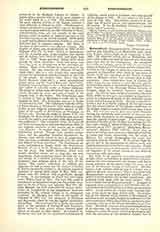

Kerssenbroch (KERSSENBROICK), HERMANN VON, teacher and historian, b. at Monchshof, near Barntrup (Lippe), about 1520; d. at Osnabruck, July 5, 1585. He attended school first at Paderborn, and after 1533 at Munster until his parents were banished from that city by the Anabaptists. He completed his studies at Cologne, where, in 1541, he received his degree of Bachelor of Philosophy and the Liberal Arts. In 1545 he left Cologne to teach in a superior school, probably at Dusseldorf, after which he was rector at Hamm (1548-50), and head of the Pauline Gymnasium at Munster, which had formerly held a high reputation. After twenty-five years of fruitful activity there, he was obliged to leave Munster, and he was placed in charge of the Schola Salentina at Dusseldorf, founded by the Electoral Prince Salentin of Cologne, where he remained, however, only three years. In 1578 he took charge of a superior school at Werl, which he soon gave up to return to Osnabruck, where he remained as rector of the cathedral school for the rest of his unsettled life. He was a remarkable teacher, and it is chiefly owing to his farsightedness that the school system of Westphalia, which was on the decline, began in a short time to show signs of new life. His first care was to place on a better financial footing the wretchedly paid teachers of the time who were chiefly dependent on the meagre contributions from the parents of their pupils. A still extant program of studies of the Pauline Gymnasium for the year 1551, entitled “Ratio studiorum schol Monasteriensis swculi XVI” (in Driver, “Bibliotheca Monasteriensis”, Munster, 1799, 165-72), shows that as teacher he laid greatest stress on a thorough grounding in Latin and Greek, advocating also the study of Hebrew, but utterly disregarding the exact and historical sciences (Realien). He required a high degree of skill in the preparation of written work, and careful and constant practice in oral recitation. Pupils flocked to him as to a revered master, while as a practical organizer of the school system he was received everywhere with open arms.
But while in his capacity of teacher he was held in high repute, as historian he suffered much unpleasantness and even persecution; his literary work had a strong influence on his career, being the cause, as it was, of his frequent change of habitation. His first known work, written while he was at Cologne, was a poem in dactylic hexameters, “Brevis descriptio belli Monasteriensis contra anabaptistica monstra gesti”, skillful in workmanship, but of slight importance. His principal work deals with the same subject, “Historia Anabaptistarum Monasteriensium”. As might be expected from a humanist it is embellished with rhetorical flourishes which produce at times an unpleasant effect. It was written on a broad scale, forming a history of the whole city from 1524 to 1554. The author had at his disposal ample sources of information, in addition to the accounts of many eyewitnesses and his own experiences, which placed him in a position to give a complete picture of the bloody disturbances of these times. He lacked, however, the essential qualifications of an historian, the critical faculty and an impartial judgment, so that the work, written at the instance and with the assistance of the cathedral chapter, was in parts most biased, to the prejudice of the municipal authorities and the patricians. Their anger being roused, they compelled him to retract several passages as being erroneous, to deliver over his manuscript, and to promise on oath to write no more books. This work was published in 1730 at Leipzig by Mencke in “Scriptores Rerum Germanicarum”, vol. III, and in a German translation at Frankfort in 1771 under the title “Geschichte der Wiedertaufer zu Munster nebst einer Beschreibung der Hauptstadt”. Detmer brought out a revised edition: “Hermanni a Kerssenbroch anabaptistici furoris Monasterium inclitam Westphaliae metropolim evertentis historica narratio” (Munster, 1899), parts of it being extremely instructive.
Kerssenbroch’s position in Munster having become insupportable, he went to Paderborn, and while there, in spite of his oath, he published “Catalogus episcoporum paderbonensium eorumque acta” (Lemgo, 1578), availing himself of Gobelinus Persona and others. The open violation of his oath lost him the respect of many friends, and forced him to leave Paderborn. At Werl he prepared a vindication, which, however, was never printed, “Causarum captivitatis M. Hermanni a Kerssenbrock succincta narratio cum earundem Vera et solida confutation”. To revenge himself upon his enemies, he resorted to a means which imperilled his life; he wrote a biting satire “Noctua”, in which he so exasperated his opponents that they sent a delegation to Werl to call him to account for perjury and breaking his oath, and his only safety lay in flight.
PATRICIUS SCHLAGER

